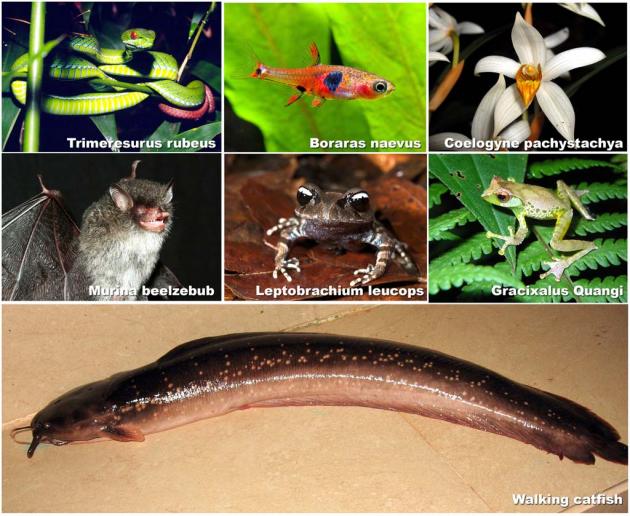Beelzebub's bat, symbol of a region under threat

The World Wide Fund for Nature yesterday revealed the discovery of 10 new species in the Greater Mekong region, including a new bat named after its devilish appearance, a subterranean blind fish, a ruby-eyed pit viper, and a frog that sings like a bird.
The creatures are highlighted in the WWF’s latest “Final Frontier” report.
WWF has also declared that the Xayaburi Dam, under construction in the lower reaches of the Mekong River, would pose a threat to biodiversity, second only to poaching by the illegal wildlife trade.
Nick Cox, manager of WWF Greater Mekong’s species programme, said the foundation had studied biodiversity in Cambodia, Laos, Myanmar, Thailand, Vietnam and China’s Yunnan province since 1997, and discovered and described 1,710 new species.
The latest study in 2011 found another 126 species in the Greater Mekong region – 82 plants, 13 fish, 21 reptiles, five amphibians and five mammals – and included them in the “Final Frontier” report, Cox said.
Among the species highlighted was the Beelzebub’s tube-nosed bat, a diminutive but demonic-looking creature found only in Vietnam. Beelzebub’s bat, like two other tube-nosed bats discovered in 2011, depends on tropical forest for its survival and is especially vulnerable to deforestation, he said. In just four decades, 30 per cent of the Greater Mekong region’s forests have disappeared.
These discoveries in 2011 were proof of the region’s amazing biodiversity, but the new species were struggling to survive in shrinking habitats, he said. He called for support for the protected areas and greener economic development to keep new species such as these safe and ensure more discoveries in the future.
As the Mekong River supports some 850 fish species and is the world’s most intensive inland fishery, Cox said, Laos’ decision to build the Xayaburi Dam was a significant threat to the region’s biodiversity and fertility.
“The dam will prove an impassable barrier for many fish species, signalling the demise of wildlife known and some as yet undiscovered,” he said.
Cox said poaching by the illegal wildlife trade was the greatest threat to many species in Southeast Asia. Organisations such as WWF and Traffic, a global trade-monitoring network, had launched a global campaign this year to increase law enforcement, impose strict deterrents and reduce the demand for products made from endangered species.
